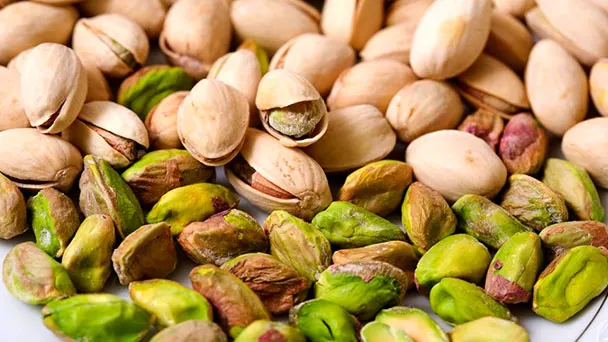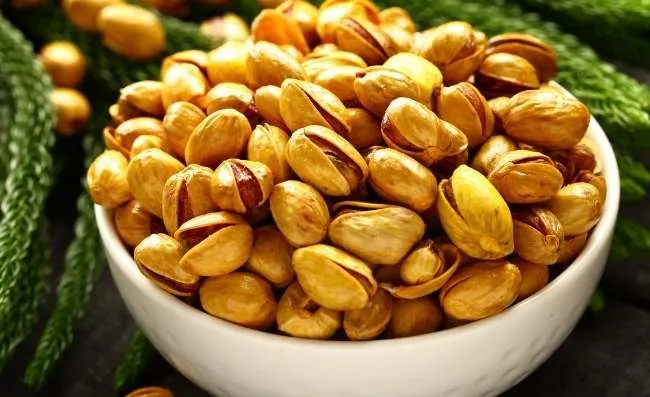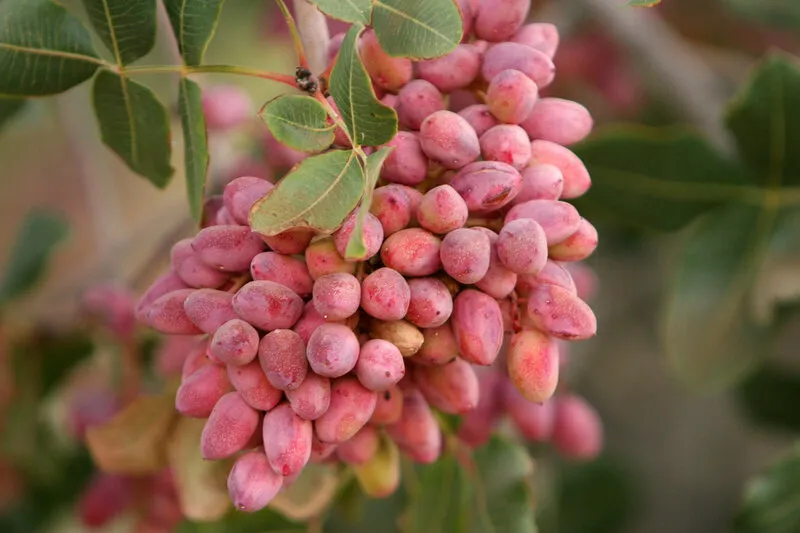Where Do Pistachios Come from?
Written by Ivy
Jan 30 2023

Pistachio originated in Iran and is now distributed in Italy, France, Greece, Turkey, Syria, Afghanistan, Iraq and other countries. There is also a certain planting area in the southwest of the United States and California. It has also been widely cultivated in Russia and Xinjiang, China.
 It is said that in the 3rd century AD, when Alexander's army went on an expedition to fight, it passed through a deserted place. At that time, there was little food left in the army. The soldiers were hungry and had lost their fighting spirit. Fortunately, there was no way to fight. Some soldiers found a pistachios tree on the mountain. At that time, pistachios was mature, So the soldiers filled their stomachs with fruit. After eating, they not only didn't get hungry, but also quickly cheered up, recovered their fighting spirit and won many battles in a row. This is the origin of pistachios.
It is said that in the 3rd century AD, when Alexander's army went on an expedition to fight, it passed through a deserted place. At that time, there was little food left in the army. The soldiers were hungry and had lost their fighting spirit. Fortunately, there was no way to fight. Some soldiers found a pistachios tree on the mountain. At that time, pistachios was mature, So the soldiers filled their stomachs with fruit. After eating, they not only didn't get hungry, but also quickly cheered up, recovered their fighting spirit and won many battles in a row. This is the origin of pistachios.
During excavation, Turkish archaeologists found evidence that pistachios appeared on the human menu more than 9000 years ago. About the first century A.D. in the United States, Syrian businessmen took it to Italy and spread it to the Mediterranean. The first pistachios arrived on the coast of the United States in 1854, but commercial production did not begin until the 1970s, Pistachios is suitable for planting in plant cold resistant areas, but their very specific climate requirements limit commercial planting. Therefore, although pistachios is one of the few fruit trees that can thrive in desert soil and extreme heat, they can only produce harvested nuts in a small part of their growing area.
Read More: The climate of pistachios needs to change with seasons during pistachios propagation. They need dry and frost free spring. The wind is strong enough to transfer the pollen of male trees to the flowers of female trees. In dry and low humidity summer, to reduce the threat of fungal diseases, the temperature of 35 ° to 37.7 ° C is an ideal range. When the winter is not cold enough, Pistachios may have fewer flowers and fruits than usual, or its compound leaves can produce three leaflets instead of five. Less photosynthesis means smaller crops. In places where it is not hot enough in summer, most nut crops will become empty shells. To plant pistachios, you need very hot summer and cold but mild winter.
The climate of pistachios needs to change with seasons during pistachios propagation. They need dry and frost free spring. The wind is strong enough to transfer the pollen of male trees to the flowers of female trees. In dry and low humidity summer, to reduce the threat of fungal diseases, the temperature of 35 ° to 37.7 ° C is an ideal range. When the winter is not cold enough, Pistachios may have fewer flowers and fruits than usual, or its compound leaves can produce three leaflets instead of five. Less photosynthesis means smaller crops. In places where it is not hot enough in summer, most nut crops will become empty shells. To plant pistachios, you need very hot summer and cold but mild winter.
We need to give pistachios a place completely exposed to the sun, because you need female and male trees to produce nuts. Your website should have space for at least two trees, allowing single and double orchards between 4.5 and 5.4 meters and orchards between 6 and 6.7 meters. According to the suggestions of horticultural experts, we can plant pistachios together in less perfect soil, This can speed up the first harvest of pistacios. Pistacia vera L is born for drought resistance, but insufficient water in late winter and early summer will reduce the quantity and quality of nuts, which will also have a great impact on the performance of the next year.
The Origin and Legend of PistachiosPistachios is An Excellent Variety1. Turkish Antep Pistachios2. Persian Elonged Pistachios (Akbari)3. Iranian Round pistachio (Fandoghi)4. Green Skinned Pistachio5. Roasted and Salted Pistachios6. Iranian Jumbo Pistachio (Kalleqouchi)7. Kernel PistachioPistachios Tree Grow and Care
The Origin and Legend of Pistachios

During excavation, Turkish archaeologists found evidence that pistachios appeared on the human menu more than 9000 years ago. About the first century A.D. in the United States, Syrian businessmen took it to Italy and spread it to the Mediterranean. The first pistachios arrived on the coast of the United States in 1854, but commercial production did not begin until the 1970s, Pistachios is suitable for planting in plant cold resistant areas, but their very specific climate requirements limit commercial planting. Therefore, although pistachios is one of the few fruit trees that can thrive in desert soil and extreme heat, they can only produce harvested nuts in a small part of their growing area.
Pistachios is An Excellent Variety
1. Turkish Antep Pistachios
The fruit of this pistachios type is long oval in shape, surrounded by a red halo in the fruit. The top of the fruit is pointed, with a longitudinal diameter of 2.5cm and a transverse diameter of 1.1cm. The fruit tree has a very high fruit setting rate and strong high yield. It is a large fruit type variety with strong growth and the most promising development.2. Persian Elonged Pistachios (Akbari)
This pistachios type has a weak tree potential. The branches of the fruit tree are curved and drooping. The fruit presents lenticels. The color of the lenticels is white. The shape of the fruit lenticels is round and very prominent. The fruit setting rate is medium. The fruit is almost oval, with a longitudinal diameter of 1.9 cm and a transverse diameter of 1.0 cm. On the top and sunny side of the fruit, The color is red, and the peel stripes on the fruit are obvious.3. Iranian Round pistachio (Fandoghi)
This pistachios type has medium tree potential, smooth leaves, sparse villi covering it, low fruit setting rate, oval fruit, yellow white color, longitudinal diameter of 2.1 cm and transverse diameter of 1.3 cm.4. Green Skinned Pistachio
This pistachios type is a central Asian group. Its pistachios fruit is large, the flavor of the fruit is not very good, and the seeds in the fruit are green and the cracking rate is high.5. Roasted and Salted Pistachios
This pistachios type has a very strong growth potential and belongs to a late flowering variety. The fruit has the characteristics of high quality, high yield and large fruit. The quality is superior in pistachios.6. Iranian Jumbo Pistachio (Kalleqouchi)
This pistachios type has the characteristics of large fruit and high yield. One of the phenomena of the fruit tree is the serious phenomenon of fruit hanging every other year. The rest is the phenomenon of empty shell and non cracking of fruit shell. The fruit tree is growing vigorously. Late flowering, high-quality fruit, large fruit and high yield are the advantages. The single core weight of the fruit is 1.3 g, and the green quality of the kernel is good.7. Kernel Pistachio
This pistachios type fruit tree has a moderate tree potential, has the characteristics of high yield and easy fruit bearing, high fruit setting rate, large fruit, white kernel and high quality.Read More:
- Why Are Pistachios So Expensive
- Health Benefits of Pistachios - Nutrition Facts
- Can Dogs Eat Pistachios
- Where and How Do Pistachios Grow
Pistachios Tree Grow and Care

We need to give pistachios a place completely exposed to the sun, because you need female and male trees to produce nuts. Your website should have space for at least two trees, allowing single and double orchards between 4.5 and 5.4 meters and orchards between 6 and 6.7 meters. According to the suggestions of horticultural experts, we can plant pistachios together in less perfect soil, This can speed up the first harvest of pistacios. Pistacia vera L is born for drought resistance, but insufficient water in late winter and early summer will reduce the quantity and quality of nuts, which will also have a great impact on the performance of the next year.
Latest Updated
- Can Dogs Eat Pistachios - What Are The Risks
- Where Do Pistachios Come from?
- Where and How Do Pistachios Grow - Pistachio Nut Trees Care
- How to Grow & Care for Pistachio Trees
- Pistachio Tree Profile
- Hong Kong Orchid Tree Problems: Diseases And Remedies
- Hong Kong Orchid Tree Pros And Cons - How Fast Does It Grow
- How to Grow and Care for Hong Kong Orchid Tree
- How to Propagate Hong Kong Orchid Tree
- Hong Kong Orchid Tree Profile
Popular Articles
- Winter maintenance of Antirrhinum Majus
- How to Grow Terminalia Mantaly Tree
- How to Grow and Care for Crossostephium Chinense
- How to grow Antirrhinum Majus in spring
- Peristeria Elata (Dove Orchid) Profile: Info & Care Guide
- Underwatered Snake Plant (Sansevieria Trifasciata) - Signs And How To Fix
- How to Care for Brazilian Jasmine Plant (Mandevilla Sanderi)
- How to Grow & Care for Graptopetalum Purple Delight in Summer
- Rosa Chinensis (China Rose): Plant Growing & Care Tips
- How to Care for Baby Sun Rose (Aptenia Cordifolia)